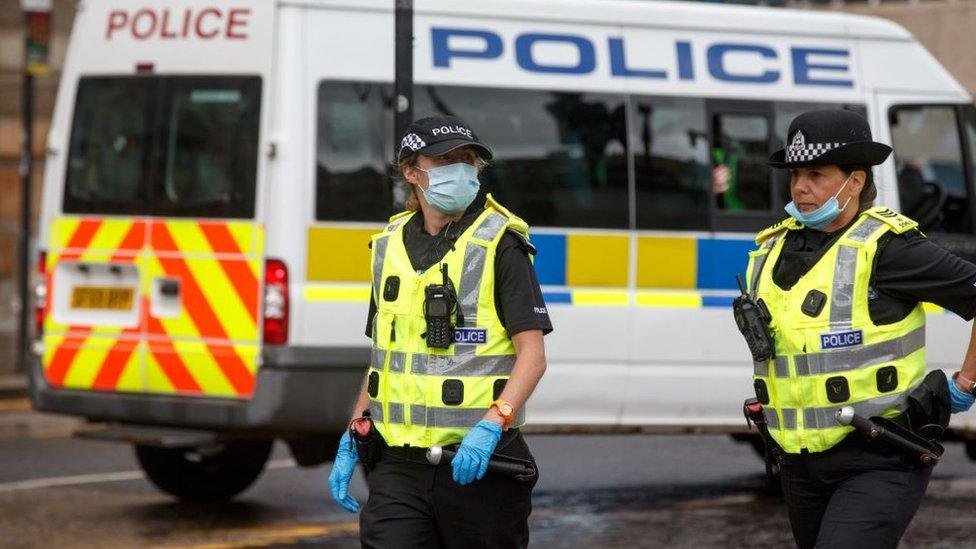Covid in Scotland: Rise in rental bookings for illegal parties
- Published
BBC team witnesses police breaking up illegal lockdown house parties in Glasgow
Accommodation rental websites are being used increasingly to book properties for illegal parties, Police Scotland data suggests.
Call logs obtained by BBC Scotland show that sites like booking.com were used to hire space for large gatherings over the festive period.
Police were given the power to break up house parties, external contravening social gathering rules on 28 August last year.
Since that date, officers have been called out nearly 7,000 times.
Most of Scotland has been in lockdown since Boxing Day with a "stay at home" message put down in law.
The latest data, received through a Freedom of Information request, showed a marked increase in anecdotal reports of house parties being held at rented accommodation over the festive period.

Listed incidents included:
Renfrewshire: Officers attended an ongoing party at a property booked via Booking.com for three nights. All people were searched, alcohol was disposed of, and all attendees were issued with fixed penalty notices (FPNs).
Inverclyde: Officers found more than 30 people attending a party following complaints. The flat was hired "under false pretence" by a "doctor" apparently working at a local hospital for a few days.
Edinburgh: A number of people travelled from England the week before Christmas. Police attended the rental accommodation and issued five FPNS.
Tayside: There were reports of parties at two lodges "with numerous cars coming and going and persons running around". More than 40 people ran off when police officers arrived.
Glasgow: Officers attended rented accommodation over the Christmas weekend. Eighteen of the 20 people in attendance were aged 16 and 17.
A search of one major rental website shows it is still possible to book accommodation in Scotland for up to 16 guests, despite much of Scotland being in lockdown until the end of February.
Booking.com said it was committed to informing customers about travel restrictions currently in place in many destinations.
The company said it had also set up tools to make it easier for accommodations to provide clear information to guests about what national and local Covid restrictions are in place.
A spokeswoman told BBC Scotland: "In the very rare instance that we are made aware of any unlawful behaviour taking place at a property listed on our site, including house parties that violate the current lockdown restrictions, we investigate thoroughly, co-operate with local authorities or law enforcement, and when necessary, we will block the responsible customer account on our platform."
Catching the rule-breakers

BBC Scotland reporter Connor Gillies describes his night following the Glasgow police officers tackling illegal parties.
"The night begins at 22:00 in a briefing room at Partick police station. We're called to a tenement in Finnieston.
Inside, as we scale the five flights of stairs the sound of laughing gets louder. The door is banged repeatedly as the occupants ignore the call to answer.
Eventually six fines are issued to a group of students who had been drinking. One of them tells me she's embarrassed.
We get word of a big party nearby. Backup is called with reports the large group is crammed in a top floor flat.
Loud music echoes down the stairwell. Police find 15 rule breakers holding a 30th birthday . The party is over, fines issued and the property owners charged and reported to the procurator fiscal.
Tonight shows there continues to be a stubborn minority who simply don't care about putting the police and public at risk."

While the number of callouts has slightly decreased since mid-September, police officers still attended hundreds of gatherings every week with callouts peaking at nearly 600 over the new year period.
The figures also show that while callouts may have declined, the proportion of gatherings in breach of restrictions has not.
On average, 73% of the weekly parties attended in December were deemed illegal compared to 33% in September.
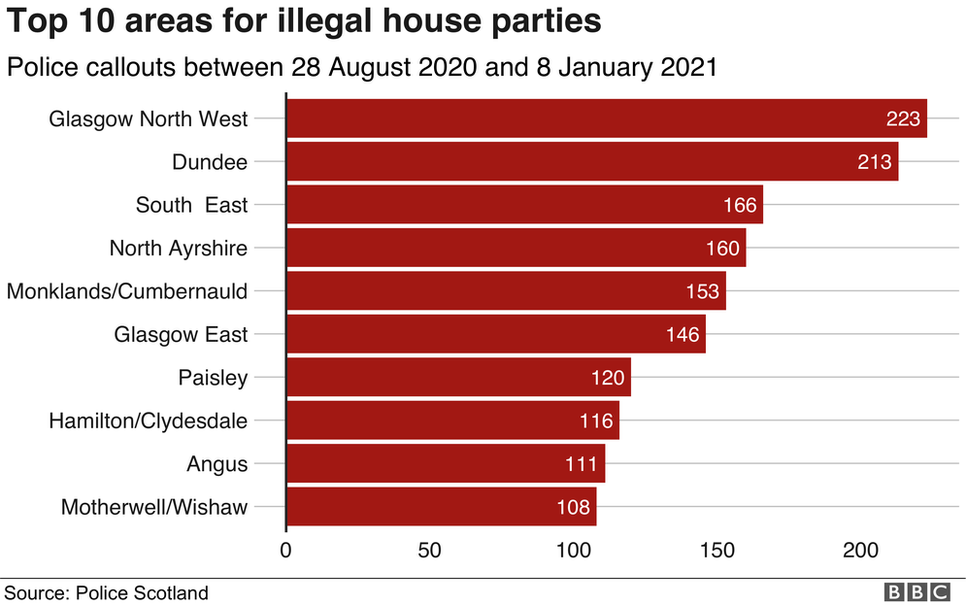
Police data showed that officers had been alerted to 6,856 gatherings between 28 August and 8 January.
However, the force has suggested the number is likely to be greater as house gatherings are typically under-reported.
Under-reporting can occur if officers were not assigned, or attended several hours later and did not enter the premises.

Internal reports for Operation Talla - the name for Police Scotland's response to the coronavirus pandemic - also highlighted the increased resistance officers are receiving when they attend illegal house parties.
These incidents included:
Argyll: Officers were bitten and punched when they attended a party in late December
Lothian: On entering a property the occupier told police he was hosting a birthday party and "didn't believe in the Covid legislation". The 10 people who had travelled from Edinburgh refused to leave
Dundee: A man was arrested after trying to headbutt officers
Edinburgh: Police had to force entry into a property following a refusal to admit attending officers. One man was arrested after threatening the officers, and another arrested after he was found hiding in an upstairs bedroom
Dundee: Officers attended a house party having been alerted to videos being uploaded to Facebook. They were initially refused entry, and party-goers threatened to defend themselves. Entry was finally permitted when "specialist units" arrived on the scene
The data also revealed that 3,647 fines have been issued, and 486 arrests made, as of 8 January.
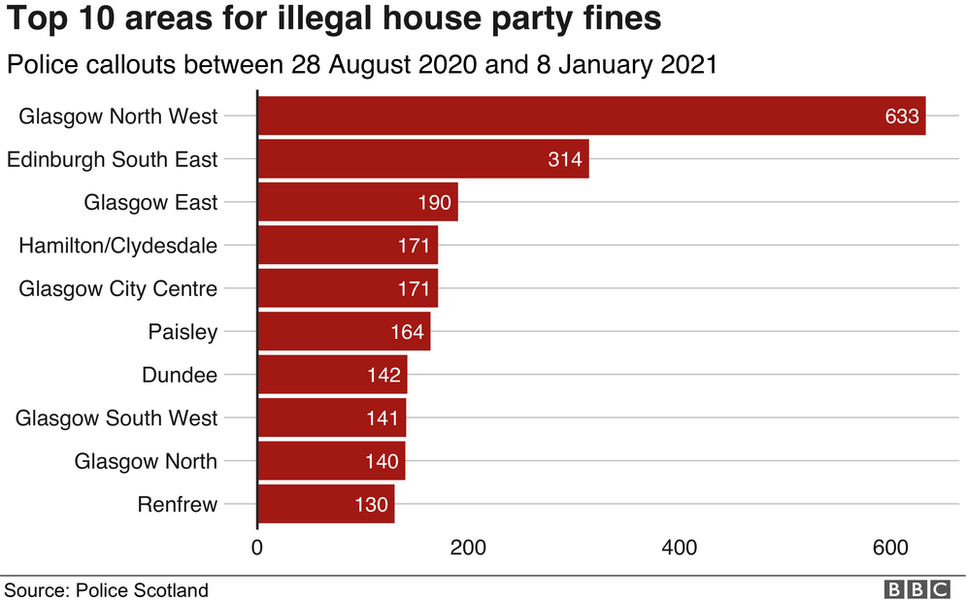
Assistant Chief Constable Alan Speirs said: "The vast majority of the public have continued to comply with the regulations.
"Parties and indoor gatherings of different households are not permitted and we will continue to use our enforcement powers to disperse large groups of people where necessary.
"Policing during the pandemic has always been challenging and it remains so."
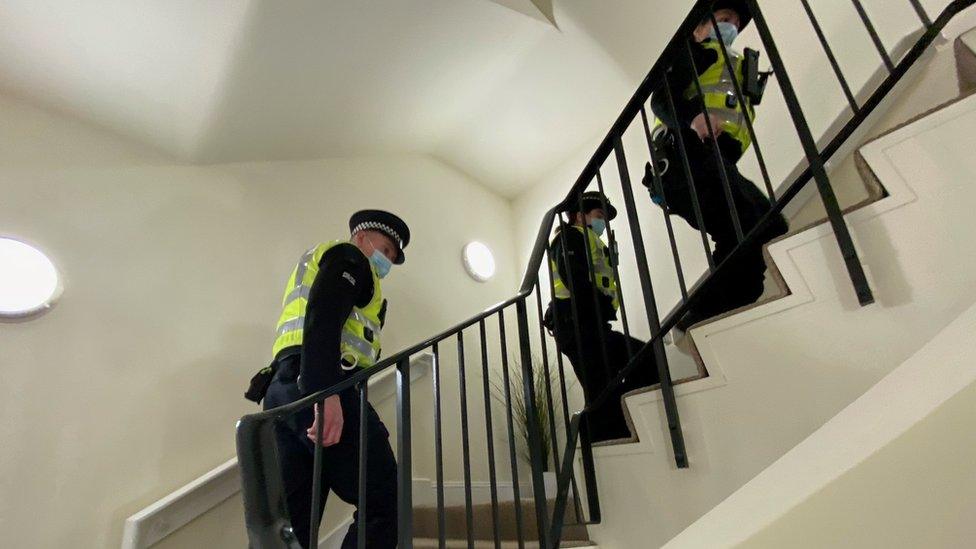
Operation Talla reports also documented a number of large-scale student gatherings including:
Glasgow: Police attended two parties on the weekend of 4-6 December. Officers found over 120 students at the locations
Edinburgh: That same weekend police attended two ongoing parties with a total of 70 students present
While only 5% of all callouts were related to student parties, internal police documents suggested they were still a considerable concern.
One Operation Talla document noted: "Students are still gathering unlawfully and are more likely to do so in larger numbers than the general population".
Matt Crilly, the president of NUS Scotland, said: "Students overwhelmingly are following the guidelines and protecting their friends, families and communities.
"However, we continue to appeal to this small minority of students to comply with the current public health guidance".


Related topics
- Published17 December 2020
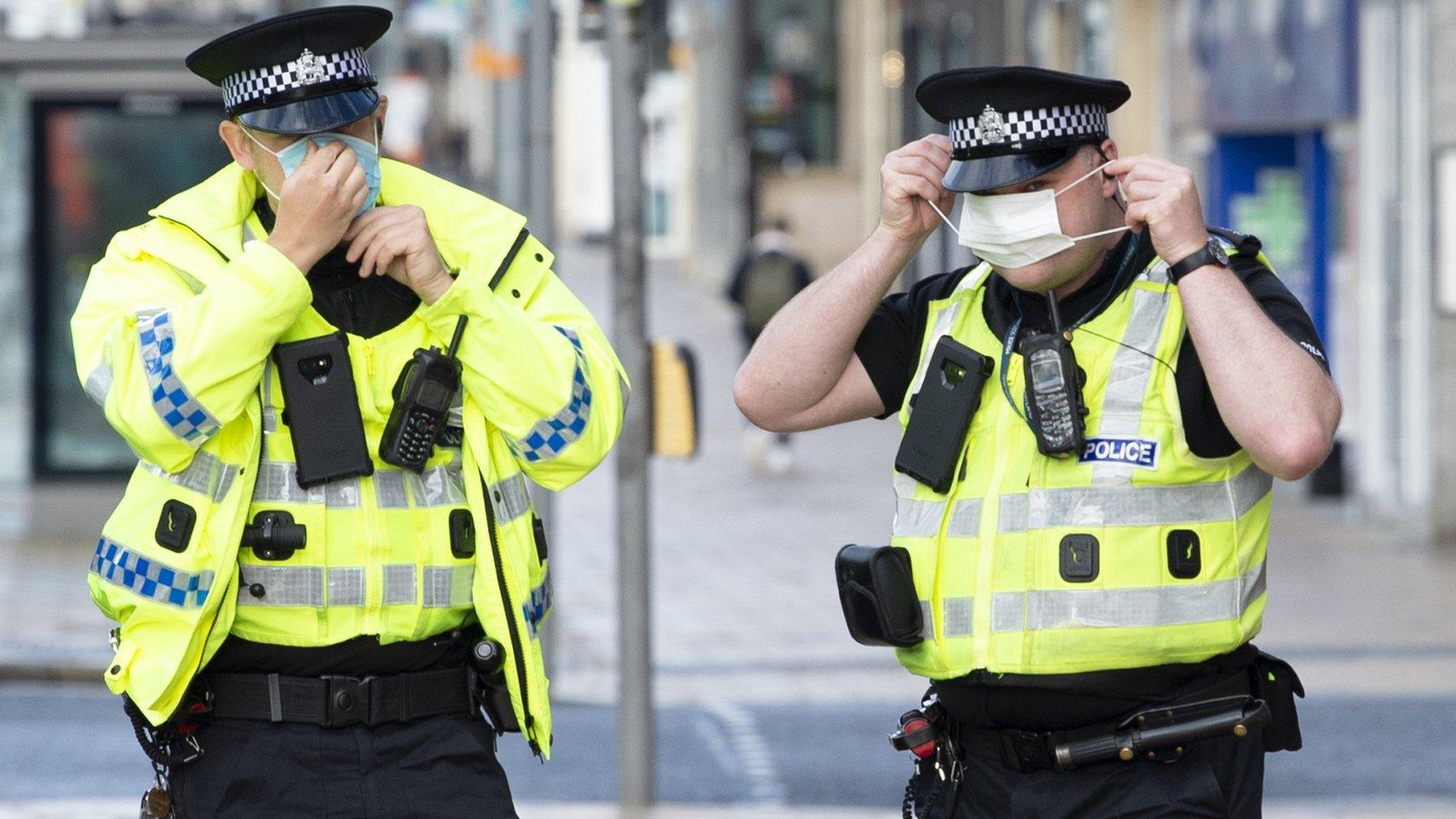
- Published28 October 2020
